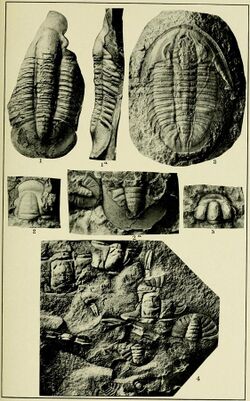Biology:Bathyuriscus
| Bathyuriscus | |
|---|---|

| |
| Scientific classification | |
| Kingdom: | |
| Phylum: | |
| Class: | |
| Order: | |
| Family: | |
| Genus: | Bathyuriscus Meek, 1873
|
| species | |
| |
| Synonyms | |
|
Orria, Orriella, Wenkchemnia | |
Bathyuriscus is an extinct genus of Cambrian trilobite. It was a nektobenthic predatory carnivore. The genus Bathyuriscus is endemic to the shallow seas that surrounded Laurentia.[3] Its major characteristics are a large forward-reaching glabella, pointed pleurae or pleurae with very short spines, and a medium pygidium with well-impressed furrows. Complete specimens have never reached the size of 7 cm predicted by the largest pygidium found. Bathyuriscus is often found with the free cheeks shed, indicating a moulted exoskeleton.[5] An average specimen will in addition have a furrowed glabella, crescent-shaped eyes, be semi-circular in overall body shape, have 7 to 9 thoracic segments, and a length of about 1.5 inches.[6]
Etymology
Bathyuriscus is a variation of Bathyurus, originally based on the Ancient Greek βαθύς (bathys) "deep", oura, "tail", thus, a trilobite with a deep tail.[4]
Distribution
Species belonging to Bathyuriscus have been found in the Marjumian of the United States (New York) and in the Middle Cambrian of Australia, Canada (British Columbia, especially in the Burgess Shale, and Newfoundland), Greenland, Mexico, and the United States (Alaska, Idaho, Montana, Nevada, Pennsylvania, Utah, and Vermont).[7]
References
- ↑ Walcott, C.D. (1886). "Second Contribution to the Studies on the Cambrian Faunas of North America". Bulletin of the United States Geological Survey 30: 5–369. https://books.google.com/books?id=wikrAAAAYAAJ&pg=PA215. Retrieved 1 July 2013.
- ↑ Palmer, A.R. (1954). "An appraisal of the great Basis Middle Cambrian trilobites described before 1900". United States Geological Survey Professional Papers 264D: 55–83. https://books.google.com/books?id=MkDwAAAAMAAJ&pg=PA66. Retrieved 1 July 2013.
- ↑ 3.0 3.1 Bordonaro, O.L.; Fojo, C.F. (2011). "Bathyuriscus mendozanus (Rusconi, 1945), trilobites del Cámbrico medio de la Precordillera Argentina [Bathyuriscus mendozanus (Rusconi, 1945), middle Cambrian trilobites from the Argentine Precordillera"]. Revista Española de Paleontología 26 (1): 11–23. ISSN 0213-6937. http://www.sepaleontologia.es/revista/anteriores/REP%20(2011)%20vol.%2026/1/02.%20Bordonaro%20&%20Fojo.pdf. Retrieved 30 June 2013.
- ↑ 4.0 4.1 "Fossil Gallery - Bathyuriscus rotundatus". Royal Ontario Museum. http://burgess-shale.rom.on.ca/en/fossil-gallery/view-species.php?id=2.
- ↑ Coppold, Murray and Wayne Powell (2006). A Geoscience Guide to the Burgess Shale, p.56. The Burgess Shale Geoscience Foundation, Field, British Columbia. ISBN 0-9780132-0-4.
- ↑ Rhodes, Frank H. T.; Herbert S. Zim; Paul R. Shaffer (1962). Fossils: A Guide to Prehistoric Life. New York City, NY, USA: Western Publishing Company, Inc.. pp. 95. ISBN 0-307-24411-3. https://archive.org/details/fossilsguidetopr00rhod/page/95.
- ↑ "Bathyuriscus" Paleobiology Database, accessed March 28, 2011
- Shah, S.K., Parcha, S.K. & Raina, A.K. (1991). Late Cambrian trilobites from Himalaya. Journal of the Palaeontological Society of India 36:89-107.
- Robison, R.A. (1964). Late Middle Cambrian Faunas from Western Utah. Journal of Paleontology 38(3):510-566
External links
- "Bathyuriscus rotundatus". Burgess Shale Fossil Gallery. Virtual Museum of Canada. 2011. http://burgess-shale.rom.on.ca/en/fossil-gallery/view-species.php?id=2.
Wikidata ☰ Q31410 entry
 |
